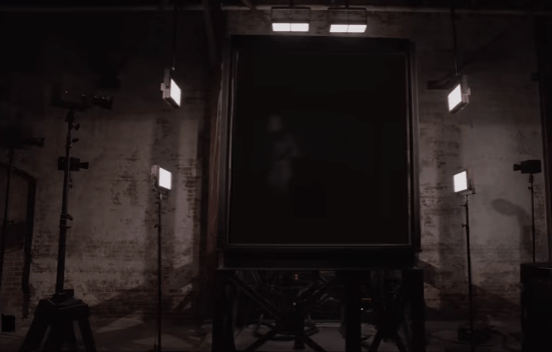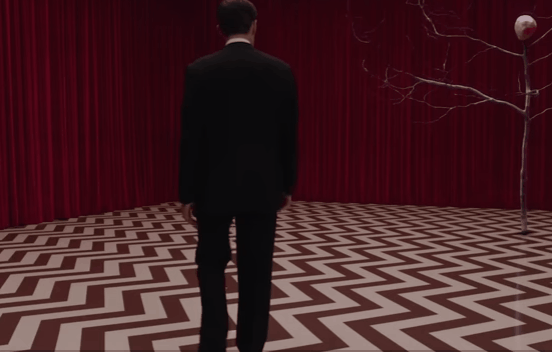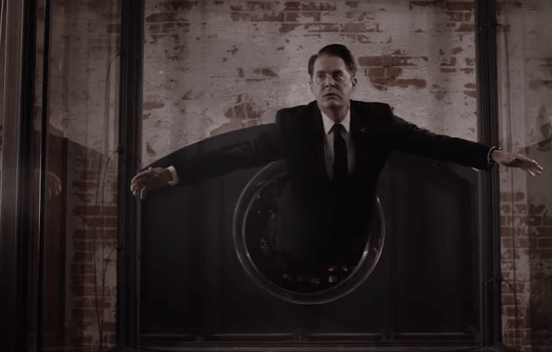If you're reading this, I'm sorry. In all statistical likelihood, you've got a loose grip on your phone, eyes down, averted from the television, which is little more than background noise. You're reading this because you're multi-tasking. I'm sorry because I'm part of the problem.
Hyperstimulation, obsessive background research, and an always-on brainfield demands most people that care about entertainment enough to grip content with both hands. Those with the TV in one, smartphone in the other, will not solely focus on what’s before them. One does not simply watch TV anymore. We hive-mind TV, just as we mega-think about the Marvel Shared Universe of films.
Leave it to David Lynch, creator and re-creator of "Twin Peaks," the serialized mystery TV show that inspired seminal series including "The X-Files," "Lost," "Breaking Bad," to deliver the captivating television anti-matter we dare not look away from.
Why has this happened?
A sea-change in audience / artist interaction is beginning.
I'll make it quick if you're unfamiliar with "Twin Peaks." Revolving around a high school prom queen's murder investigation in a northern Washington sawmill town, it was a dreamworld semi-parody of nighttime soap operas like "Dynasty." It included tons of bizarre characters, continuous story drama, and dream-logic.
This is standard operating procedure these days. All Netflix, AMC, FX, and HBO original shows have through-line stories because of Twin Peaks popularizing the format in the late-80s. They literally invented the term 'watercooler shows' because that’s where the conversations took place the following day to discuss the prior night’s developments.
Time passes and the watercooler is now the internet, and the following morning is now while the fucking show is taking place. Do you remember when everyone was sweating over the final episodes of "Breaking Bad?" Do you remember parsing clues and spitting venom at the end of "Lost?" Tune into Twitter on show night for "Game of Thrones" for the current equivalent.
"Twin Peaks" invented this conversational deconstruction. Now, "Twin Peaks: The Return" is here to lash it to a rocket and fire it into the ionosphere.
(The tree may represent a man's severed arm.)
Just as Lynch conceived the original show was a parodic dreamscape of ultra-popular nighttime soaps, he and co-creator Mark Frost have once again developed a parody of television's clue-hunting, hive-mind audience, streaming era.
Frost and Lynch's realized they’d created this monster with the original show.
In an LA Times article in 2010, Mark Frost, expressed:
"Honestly, the most annoying and troublesome aspect of making the show was dealing with that entire segment of response to it because it was so unrelated to the actual work itself," says Frost. "The kind of feeding frenzy that is kind of routine in pop culture was just sort of starting to come together then."
"Twin Peaks: The Return," as of this writing four episodes into their 18 episode miniseries run on Showtime, is another deliberate counterpoint to what audiences expect of the overly-familiar television series format.
The reviews of the first episodes are remarkable to read. From Variety's review of the first 2 episodes we observe trepidation and excitement:
"Twin Peaks: The Return is weird and creepy and slow. But it is interesting. The show is very stubbornly itself — not quite film and not quite TV, rejecting both standard storytelling and standard forms. It's not especially fun to watch and it can be quite disturbing. But there is never a sense that you are watching something devoid of vision or intention. Lynch's vision is so total and absolute that he can get away with what wouldn't be otherwise acceptable."
The reviews of those initial episodes are at a loss for words. But they know that they’re good. That's the stunning thing. They don't know what to say about them, but they can't look away, and isn't that the point for a continuous television story?
So how did Frost and Lynch do this? How did they make a gripping show that used to be about solving a mystery into a show about NOT solving a mystery?
How did we arrive at this non-conventional, defiant point in entertainment history?
Like it or not, "Twin Peaks" remains a dreamlogic playground. Inception, god bless Christopher Nolan, is far too literal to compete with Lynch's Twin Peaks dreamscapes. Everything in the new episodes are long, pregnant, "huuhhhh… whaaaattt… is thattttt… uhhhh…" moments that force viewers out of their comfort zones. We’re so comfortable these days eyeballing Easter eggs in our TV and movies.
"That's Thanos," we whisper, twenty minutes into "Guardians of the Galaxy."
"That’s Darkseid," we whisper, midway through "Batman V Superman."
"That's Jason Statham," we whisper during the credits for "Fast & Furious 6."
"Yeah, no fucking shit, dude, I just Googled it. He's gonna karate fight The Rock in the next movie!"
My affinity for the "FAST" movie franchise notwithstanding, go ahead and try to look up answers to what's happening in "Twin Peaks: The Return" right now. This ain't no shared universe. It's not a reboot of "The Mummy," starring Tom Cruise. It isn't a marketing exercise from giant entertainment companies to lure one audience demographic into a new film genre.
No, this is "Twin Peaks: The Return," and it's here to film ghosts and puke corn, and it's probably gonna keep filming and puking.

Nobody knows how to dissect it. To respond to it. It's awesome.
In a recent interview about the "Twin Peaks" revival, David Lynch said:
“I think feature films are in trouble. I think art houses are dead. Cable television being a place for a continuing story, told with freedom, is a beautiful thing.”
Well, great dude, but the only thing the internet seems to be able to latch onto after four episodes of the new show is that Michael Cera cameos as a weirdo biker blatantly, obviously, cruelly, deliberately aping Marlon Brando from "The Wild One," a movie from 1953 I promise you’ve never seen.
Are you understanding the joke yet? You, over at The Verge, shut up. Yes, this show should be called Twin Peaks, you don't get the joke.
Lynch looked down the barrel of our Golden Age Of Television. He understood the conversations around "Mad Men," around "Breaking Bad," around "The Sopranos," armored in dead-serious prestige television about men, and crime, and shit, and Lynch decided to make 18 episodes of not-that.
He internet-proofed his thing, thus freeing us from clue-hunting as we watch our goddamn TV, and instead leaving us staple-gunned to our couches, while a can of dreamlogic is shotgunned into our stunned mouths.
The Hollywood Reporter's review of things thus far emphasizes that this is a different beast (with little else to say):
"It's obvious this Twin Peaks is going to be an 18-hour unit. There was no discernible separation between hours and if credits hadn't rolled, the second hour could probably just as easily have flowed into the third. This isn't episodic TV. It's another thing."
Oh, you expected familiar "Twin Peaks" characters? They'll sometimes appear to look at boxes of old evidence.
Oh, there’s a new, weird case going on in North Dakota? It's loaded with bad acting and nonsense plotting.
Oh, what does this glass box with video cameras mean? It means everyone is gonna be eaten alive by ghosts.
What is going on? Who cares. Just watch. It's modernity's anti-matter.
What comes next in our new TV weirdland?
Per the AV Club's review of the first two episodes:
"If you were looking forward to a return of the sometimes campy, sometimes cozy humor of the original two seasons of Twin Peaks, this premiere could come as a shock. If you were anticipating that once jolting, now familiar blend of genres, this is... not that."
(Special nonsense.)
The final question is: what comes next?
If "Twin Peaks" originally influenced all the phenomenal serialized television we enjoy today, then what will its revival do? I posit it’ll wake us up a little bit. Our palettes will expand and welcome more weirdo TV, film, and art. We’ll be inspired to sidestep the shared universe as a service (SUaaS (lol)) storytelling and inspire creators, and the jerks that give the creators money to make stuff, to experiment more.
The nearest modern show I can cite alongside "Twin Peaks" is "Legion" on FX, which somehow escapes the sin of being part of Fox’s X-Men movie shared universe up to this point. It’s mind-logic, and visual nonsense, and brilliantly-written, check it out if it hasn’t been pulled from Hulu yet.
For now, we have nowhere to go but weird.
As Lynch’s character outlines during his appearance on "Louie," the three rules of showbusiness are:
- "Number one: look 'em in the eye and speak from the heart."
- "Number two: you gotta go away to come back."
- "And number three: if somebody asks you to keep a secret, their secret is a lie."
Now, log off and focus on one thing at a time. You'll be alright.






















